I am profoundly acquainted with the new age movement.
As someone who has explored, and in many cases practiced (and sometimes promoted), the endless varieties of new age methodologies and philosophies out there, I’ve seen pretty much all of it.
While yes, there’s a lot of undeniable beauty in the new age movement, there are also a lot of unhealthy and even dangerous elements within it, surprisingly.

Soul Work Compass Course:
Feeling lost, stuck, and trapped in repetitive cycles of pain? Discover your Soul's Compass to reclaim your purpose and find your path to freedom.
⭐️⭐️⭐️⭐️⭐️ "I am finding out so much about myself and having so many realisations about my life ... I already know it is what I’ve needed for so long." – Jen N.
Also, while there are lots of religious articles out there condemning new agers, there aren’t many non-religious folks shining the lights on the ins and outs of this popular movement.
I hope to bring more balance to this arena. My goal is to support you, particularly if you’re new to the spiritual journey (and even if you’re a veteran), in avoiding the traps and pitfalls inherent in new age mentality.
After being disillusioned too many times and witnessing the confusion of those on this inner path alongside me, it’s time to get real and grounded in some down-to-earth spirituality.
Table of contents
What is the New Age Movement? (It’s Origins)

The new age movement is an eclectic combination of many different psychological, philosophical, and religious ideas from around the world. It emerged after the countercultural hippy movement of the 1960s and began to truly blossom by the 1980s.
Ethnobotanist and psychonaut, Terence McKenna, once defined the new age in this way:
The New Age is essentially humanistic psychology eighties style, with the addition of neo-shamanism, channeling, crystal and herbal healing, and this sort of thing.
The original driving force behind the new age movement was to liberate humanity from the dry, rigid, life-denying, and in many cases, dangerous ideas propagated by orthodox religion.
Such a noble and worthy ideal to leave corrupt religious ideology resulted in the impulse to combine, cross-reference, and merge multiple wisdom paths and teachings to achieve a kind of universal unity.
Want to get LonerWolf at the top of your Google search results?
Unfortunately, however, this syncretism, this fusion of different ideas and practices from around the world led to a dilution of their power. As such, we now have terms like “new age fluff” which is self-explanatory, and also references to “new agers” which is a term that’s increasingly used in disparaging ways.
Note: not every “non-religious” form of spirituality is necessarily new age. In other words, those who identify as “spiritual but not religious” are not always new age (although sometimes they can be).
Benefits of the New Age Movement

Although I’ve called new age spirituality the “McSpirit” of spirituality (and I still stand by that), I also want to point out that it does have value.
There’s a lot of good inherent in new age spirituality.
Here are some of the benefits or best things about the new age movement:
- It challenges religion – considering all the horrors perpetrated by religion, this point is enough to make the new age movement a positive force in the world
- It’s friendly and acts as a doorway into the spiritual path – for those totally new to spirituality, the new age movement’s focus on good vibes only and “love and light” encourages the spiritual impulse to come out and play
- It provides people with hope – many who have suffered terrible loss have found solace in the gentleness of new age ideas and practices
- It promotes the divine feminine – most religious paths are masculine dominated and therefore alienating to the other equally present force of life: the feminine (or yin)
- It embraces the body and sacred sexuality – sex, sexuality, and the body as a whole aren’t seen as shameful or wrong, but are celebrated, and this is beautiful
- It elevates the role and value of nature – nature is seen as sacred, not something to be used, ignored, or dominated (as in many religious paths)
- It emphasizes a personal connection with the Divine – for those who feel spiritually hungry, the new age movement reminds us that yes, we can connect with the Divine, it is our birthright!
In my years exploring, practicing, and in some cases promoting the new age movement, I’ve witnessed these wonderful benefits.
However, as positive as it is, it also swarms with numerous ‘demons’ beneath the surface.
The Cons of the New Age Movement, aka. McSpirituality
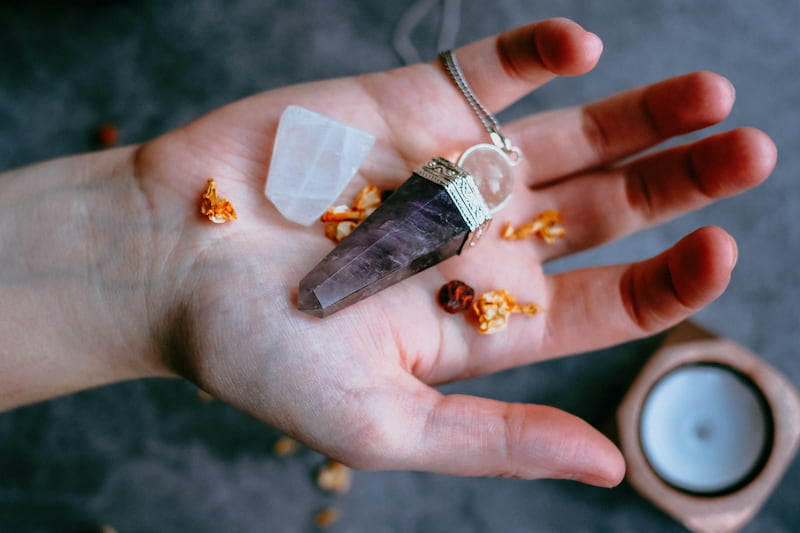
Without getting wordy and long-winded here, let’s just get right into the cons and greatest disadvantages of the new age movement.
I present these issues so that you can be keenly aware of the traps inherent in the new age movement that many overlook and never mention.
Hopefully, this exposé will save you years of struggle, confusion, and pain:
Would you like to save this?
Your information will never be shared.
1. Encourages Spiritual Escapism
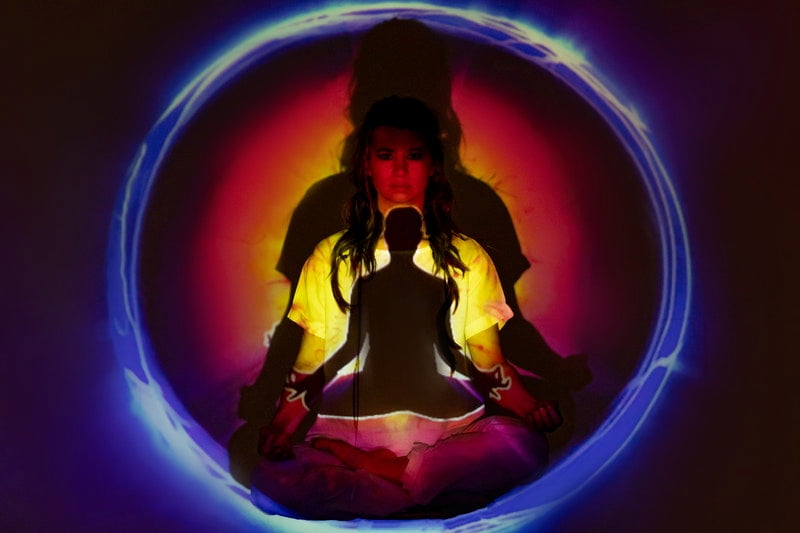
As sparkly, cosmic, and feel-good as new age spirituality is, it’s also undeniably a form of escapism.
“Why is that bad?” you might instantly wonder. “Reality is full of terrible horrors.”
Yes, it’s true that reality can sometimes be hard to deal with. Government corruption, social media fake news, poverty, wars, trauma, racism, sexism, environmental destruction, and more recently a world pandemic can overwhelm us.
Some people may need the new age movement to help them get a handle on their mental health, and that’s totally understandable. I’ve been there too.
And yet, if we stay within the new age, with its emphasis on everything that is out of this world (spiritual ascension, higher vibration, higher self, 5D, pleiadians, aliens, etc.), we ignore the need to face this human experience. We spiritually bypass the uncomfortable reality around us and become addicted only to that which gives us a spiritual high.
This focus on anything that is blissful, transcendent, and full of light isn’t progressive, it’s regressive. It’s infantile spirituality.
Furthermore, the spiritual path isn’t all about love and light. It is also about darkness, pain, ego death, and awkward transformation as well. If you truly want to “follow your bliss,” you’re going to have to deal with some ugly situations, feelings, and tendencies within you and others. And that’s a fact of life.
2. Low Committment and Low Impact
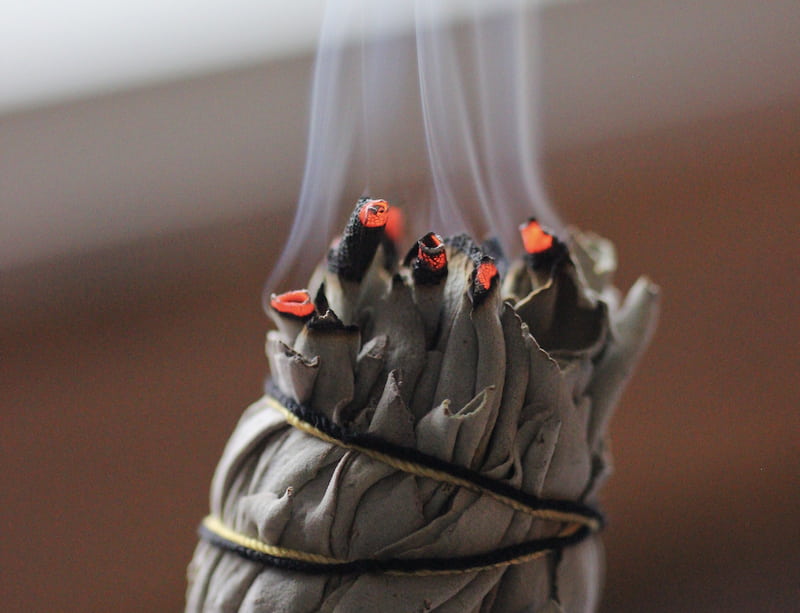
Because of the escapist nature of new age spirituality, it tends to avoid the issues plaguing the world, and thus makes little to no active social impact.
Poverty, racism, environmental degradation? Forget it! Although on the surface the new age movement talks a lot about how “sacred” everything is, when it comes down to it, there isn’t much active involvement in the world. If there is active involvement, it’s usually because the new age practitioner has sided with another philosophy like veganism, feminism, minimalist, sustainability, and so on.
There is also a marked lack of commitment amongst new age practitioners who tend to jump from one philosophy or practice to another. If drumming circles become boring or unfulfilling, angel channeling becomes the next dopamine hit. Perhaps crystals and manifestation grids will come next, and then studying numerology and getting a psychic reading will follow.
As detrimental as religions have been to humanity, there is one thing that they have offered us, and that is the ability to commit, to make a substantial social impact, and to provide in-built accountability.
With the new age movement, there’s no accountability – you’re meant to keep yourself in check. And yet as a fallible human being, is that really reasonable?
As Steve Bruce writes,
[New Age] elicits only slight commitment and little agreement about detail. It thus makes a shared life unlikely. It has little social impact. It has little effect even on its adherents. It does not drive its believers to evangelise. It is vulnerable to being diluted and trivialized . . . eclectic to an unprecedented degree and dominated by the principle that the sovereign consumer will decide what to believe . . . a low-salience world of pick-and-mix-religion.
This ‘pick-and-mix’ spirituality that the new age movement essentially is, results in what we could call ‘spiritual tourism’ – hopping from one thing to another without ever settling down, going deep, or seeing through.
Don’t get me wrong, exploring and being curious is healthy and beautiful. But the shiny allure of the new age movement can keep us perpetually stuck in that place, without ever deepening.
Read more about: Spirituality vs Religion: 11 Differences (With Pros & Cons List)
3. Stunts Our Growth

While it’s liberating at first to be able to cherry-pick what we like out of various wisdom traditions throughout the world, it also tends to stunt our growth.
The term “new age fluff” sums up what I’m about to say pretty well: with the ability to pick and choose what we like, we also get to avoid what we dislike. Namely, the new age movement promotes avoiding the reality of pain, darkness, death, and suffering. Instead, new age practitioners tend to focus only on what feels good, is affirming, is artificially empowering, and helps them to avoid the harsh realities of the world.
What happens when we avoid the darkness is that we become stunted. We become overly dependant on our ‘healers,’ ‘psychics,’ ‘shamans’ and other people and tools to alleviate our pain and provide us with direction. We lose the ability to develop resilience, focus, determination, and deep courage.
My conclusion is that while yes, religion often equals imbalanced yang/masculine energy the new age movement represents the opposite: imbalanced yin/feminine energy.
4. Promotes Spiritual Consumerism
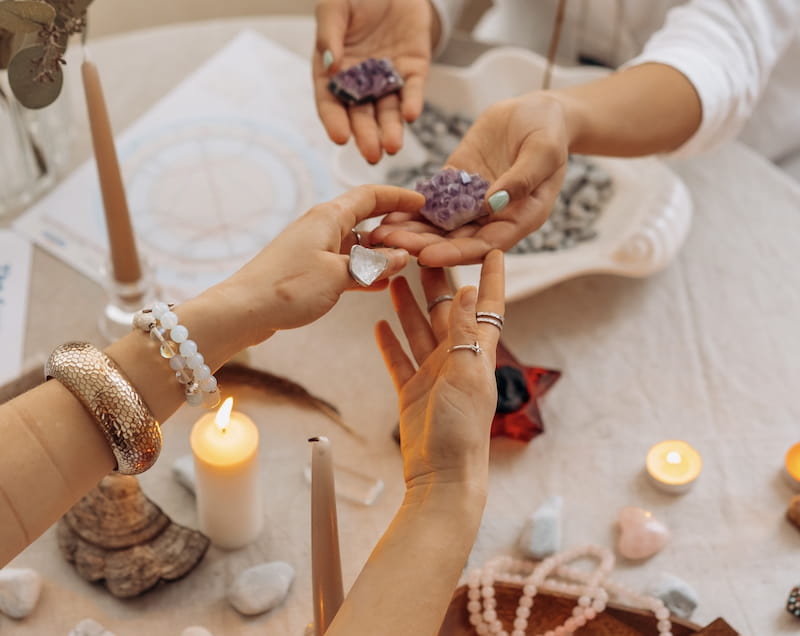
I’m sure you’re familiar by now with what a “new age shop” looks like. Walking in, you’ll find an endless assortment of candles, crystals, incense, dream catchers, cards, books, statues, essential oils, and the list goes on and on. Chances are there’s even one in your own town!
If you’ve been on Instagram or any other social media platform, you’ll also likely be familiar with the “spiritual aesthetic.” This new age invention involves pictures that look dreamy, airy, and feature an array of crystals, pendulums, candles, and other metaphysical trinkets (perhaps with a yoga mudra or pose thrown in for good measure). Such consumerist imagery is everywhere. And it’s mesmerizing!
Within the new age movement there’s almost this unspoken assumption and even rule that in order to be spiritual, you need to look spiritual. Without looking spiritual, without displaying your beautiful spiritual material items to the world, you might as well not bother!
While there’s nothing wrong with having some pretty or mysterious looking tools, when your spiritual path is all about getting more, it’s spiritual materialism. As the Tao Te Ching says,
Reduce what you have. Decrease what you want.
If you’re on the spiritual path, you’re probably already quite aware of the fact that stuff doesn’t make you happier. Material things don’t fill that void within you. In fact, they often contribute to feeling empty inside.
And yet, because of the lack of a strong central core, the new age is prone to fuelling such an insidious branch of consumerism that preys on spiritually empty and undiscerning individuals.
5. Results in Cultural Appropriation

Cultural appropriation is what happens when someone (usually from a dominant culture) adopts elements from another (usually a non-dominant) culture.
For instance, someone might adopt the fashion, tattoos, speech, rituals, and other practices from another culture without asking for permission or acknowledging where that adopted element came from.
Unfortunately, the tendency to promote cultural appropriation is one of the more nauseating elements of the new age movement. I’m sure you’ve seen and heard ‘new agers’ use and misuse rituals, items, and other sacred words and beliefs that disrespect the original culture that carried these customs.
Now, I’m aware that some level of cultural mixing is necessary and needed in the world. Variety is the spice of life, as they say. And I’m not the “woke police” trying to punish anyone for saying a Sanskrit mantra or wearing an Om pendant – that’s silly and honestly another form of ego inflation (by acting as the almighty savior or punisher of others).
But when someone tries to identify as a member, for instance, of an indigenous culture when they’re clearly not, that’s obviously disrespectful. And that’s the thing about the new age, it creates this “noble savage” idea about other cultures and promotes using their customs without having a dialogue and finding a sense of shared humanity.
Some examples of cultural appropriation perpetuated by the new age movement can be found in the misuse of Native American spirituality (sweat lodges, smudging, etc.), self-styled shamanism that borrows sacred rituals without permission, and other metaphysical practices.
Note: not all use of other cultural images is necessarily disrespectful or blatant cultural appropriation – it’s all about the context. One helpful question many new age practitioners would do well to ask is, “Are my actions hurting or degrading the value of other cultures?” and “How am I promoting white supremacy or racism by purchasing this or practicing that?”
6. Promotes Ego-Centrism
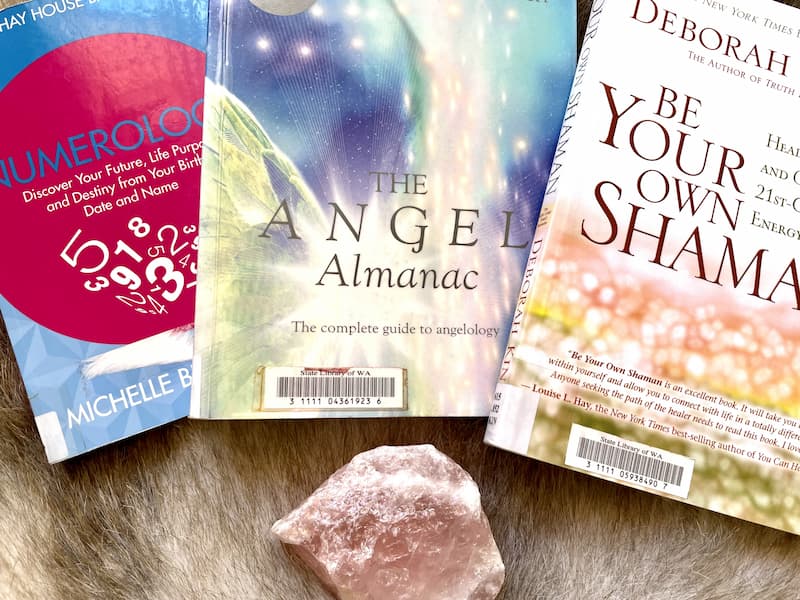
While I find most religions distasteful, I do appreciate their ability to help their adherents to practice humility and recognize the limitations of the ego. The opposite is true with new ageism where you essentially become God.
If I was given a gold coin every time I saw a post, book, workshop, or other spiritual resource promoting “your gifts,” “your power of manifesting,” “your growth,” “your angel number,” “aliens who have contacted you,” “you being a goddess,” “your planet in mercury retrograde,” etc. etc. … I would be Supreme Ruler of the Universe. ;)
Certainly, it’s normal and good to learn about ourselves. It’s important to desire to better our lives. But at a certain point, our spiritual paths need to move beyond just us and our interests and instead to others, nature, the world, and the Divine. If we’re always focusing on ourselves, our spirituality can quickly become ego-centric and shallow.
“Not my will but thine be done” was probably one of the more illuminating phrases of Jesus and it’s a quality I, once again, appreciate about religion (as much as I dislike most religious institutions). Humility, reverence, and devotion are all qualities blatantly missing from new age spirituality.
And the irony is that while the new age demonizes the ego, it is ruled by it – when one’s spiritual path is all about “me, my, and mine” how could it not be?
At some point, we need to learn to surrender, to let go, and to trust in something Greater than ourselves.
Even the focus on one’s Higher Self can be confusing, mixing up the subjective ego with the objective Divine essence. Sadly, this leads to one of the greatest tragedies: a grotesquely inflated ego that is drunk on its own supposed ‘virtues,’ ‘gifts,’ insights, and ‘downloads’ from the Divine, mistaking itself as ‘enlightened’ and essentially untouchable. I call this grievous pitfall spiritual narcissism.
The reality is that for true spiritual growth to occur, the ego must dissolve and go on an immensely painful process of ‘crucifixion’ and dismemberment. There’s just no way around it folks.
How Do I Avoid the Perils of New Age Spirituality?

The result of all the above six pitfalls of new age spirituality is why I refer to it as McSpirituality (or the McDonalds of spirituality if that isn’t clear).
The unfortunate conclusion I’ve drawn after more than a decade in this field is that it is like junk food – sure it fills you, but it ain’t that good for you.
That being said, yes, there are good things about the new age. But if we want to be more than just tourists and dabblers (which is fine), if we truly want to touch deep states of peace, love, and freedom, we need something more.
How do we avoid the perils of McSpirituality? Here are some suggestions:
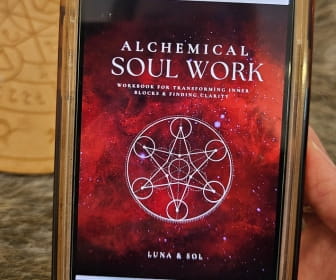
Struggling with inner blockages?
Learn how to transform your confusion into clarity. With 50+ deep dive prompts, your journey of self-discovery awaits in our Alchemical Soul Work Workbook.
- Find one holistic path (that involves the body, heart, mind, and soul) and go deep within it. Follow it through until the end. Recognize the hedonistic adaptation that makes you want to jump around and try something new. (Of course, it’s okay to experiment with other practices, but ensure you have one central unmoving one.)
- Find a path that has in-built accountability. In other words, when you’re getting lazy or forgetful or are totally off your tits with bizarre ideas, who ya gonna call? Who is there to help motivate, correct, and guide you? Having a community to return to unified with the same purpose will be essential.
- Find a path that focuses on honoring something greater than yourself. Humility is such a crucial part of the spiritual path, and if it’s all about you all the time, it will become shallow and unfulfilling quite quickly.
- Be courageous and dare to face the shadows. Learn to accept (and find resources that help you to embrace) the fact that life is full of a lot of nasty shit. There is pain and suffering everywhere. How can you face that? How can you embrace the fact that one day you will die?
- Find a path that encourages social change. As a Buddhist, I adore the term coined by Zen master Thich Nhat Hanh: interbeing. Such a word refers to how interconnected and essentially inserparable we all are. What we do influences everything else, and everything else influences us. This simple concept helps us to understand how important it is to live consciously and inspires action. Ask yourself, what can I do to make a change in society, however small?
I think anyone new to spirituality is bound to fall into the trap of new ageism sooner or later – me included. But it’s okay. This is all a learning process!
The Third Way
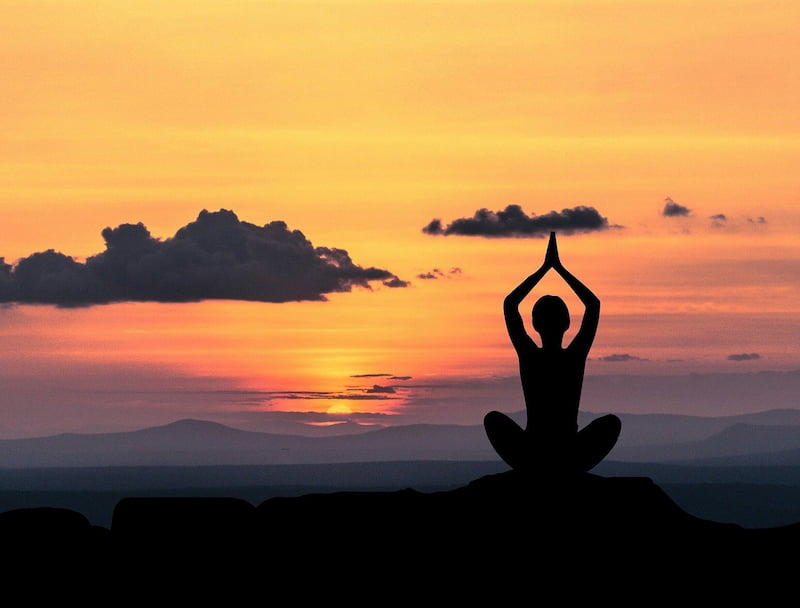
There are times when the spirit is completely darkened because it needs to be reborn.
– Carl Jung
In many ways, the new age movement is the antithesis of religion. Yet I believe the friction between the new age and religion is needed to create a third way, an integration of both new age free-thought and religious depth.
In other words, if our spiritual paths are to mature, there needs to be a synthesis of the yin (new age) and yang (religion).
Without religious qualities, new age is shallow, consumerist, escapist, and ego-centric. And without new age qualities, religion is stale, dry, shame-inflicting, and dogmatic.
So the question I pose to you now is this: how can you walk the third way? What does that look like for you?
Final Words
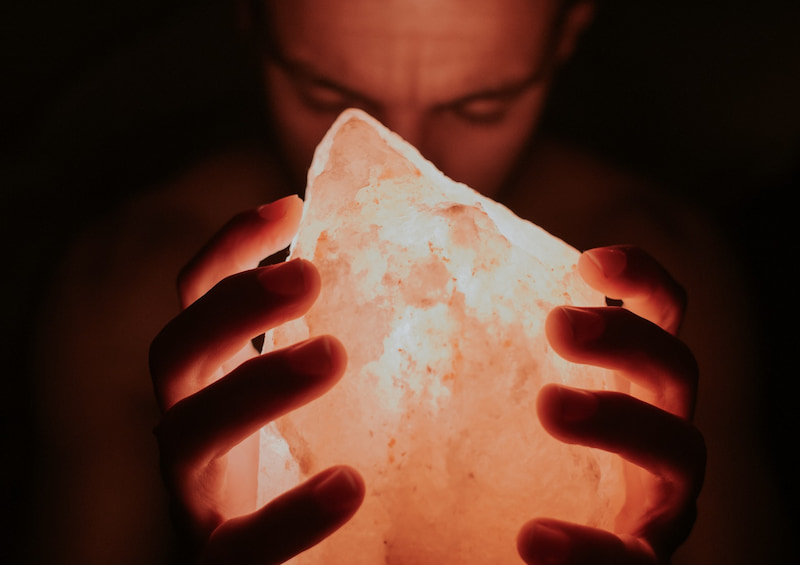
New Age culture cannot create a shared sense of direction or movement because it’s central body elicits little commitment and agreement about the details. With it’s endless varieties, techniques and practices, people cannot unite to evangelize it, it becomes trivialized and diluted.
– J.R. Lewis & J.A. Peterson, Controversial New Religions
The new age movement has helped humanity, but also hindered it.
With its tendency to selectively choose only pleasant truths, it denies the essential wholeness of the human condition with all of its joy and suffering.
Is it “bad” or “wrong” to dabble in the new age? Absolutely not. We all need to do a little exploration which is totally healthy and normal. And if we want to stay within the new age forever, that’s fine too. At the end of the day, we’ve all got to do what suits and resonates with us.
But for those who are called to go beyond the new age, I hope this article has helped, inspired, and motivated you to go a little deeper.
What are your thoughts about the new age? I’d love to hear below. Please also share this article with someone if you think it might help them. ♡
If you need more help, we offer 2 powerful ways to guide you on your inner journey:
1. The Soul Work Compass Course: Break free from feeling lost and disconnected. The Soul Work Compass is a practical 12-step course that transforms soul loss into soul clarity. Discover your core values, heal core wounds, and create a personalized compass to guide every decision you make.
2. The Inner Work Journal Bundle: Heal at the root. This Inner Work Journal Bundle guides you through self-love, inner child healing, and shadow integration with 150+ prompts and activities. You get editable digital files to use on any device or print unlimited times. Not for lukewarm seekers, these journals are for those ready to transform.
 $3
$3
I’ve definitely been influenced by New Age practices. I started going to 12 step recovery programs in the early 90s. Through recovery women I was invited to my first women’s retreat. The predominant activities I remember are making flower crowns, journaling, and smudging.
Smudging is cultural appropriation, because it is a specific practice stolen from Indigenous people. I don’t know about all white people, but I purchased my smudging kit from white people in a metaphysical, new age leaning store. When I’ve done smudging, I guessed at it.
I think to avoid making money off the spiritual practices of Indigenous people is to learn the practices from Indigenous wise people who’ve studied the practices a life time and get permission from them to use the practices.
A good answer I’ve heard to cultural appropriation is to study the spiritual practices of your own culture.
The term “plastic shamanism” makes me cringe. I am guilty of listening to and buying books from white people claiming to be shamans. I didn’t investigate their background to see if they learned from Indigenous shamans. I am definitely staying away from Indigenous practices.
In the article the author talks about some things I want to watch out for.
-I do not want to flit from practice to practice. What I do follow I want to delve into deeply.
-On being too shallow and unrealistically positive, I want to be aware of and process my darker emotions. Embrace my shadow side and unloveable parts.
-No spiritual community. I left the Catholic church because I no longer believed in a Christian God, I related to something more general: Spirit, the Divine, a power higher than a higher power, incorporating the vastness of the cosmos, the universe.
In the churches I attended, I wasn’t finding people I related to. I was not attracted to the volunteer activities available. The ones I tried I didn’t want to continue. I am interested in the labyrinth and was meeting with other women interested, but their practice of Christianity did not accept me as a Lesbian.
The spiritual community I have is the 12 step programs’ members. And my seeking of those who want to discuss spirituality. So far the only way I’ve come up with is to investigate FB groups and start this one. I’m committed to this group and determined to persist, but discouraged it’s usually just me posting
-Lack of humility. Again I rely on 12 step programs. My sponsor talks about kindness, caring, empathy, etc. bringing us to a higher spiritual plane.
I agree with her that grey areas are good too.
She also talks about humor and not being too serious. This post is too serious and the only semblance of humor is this area of the post.
Thanks for outlining these inner reflections Debbie. I admire your vulnerability and willingness to grow and evolve – sincerity is something not as “trendy” these days, yet it’s so crucial for us to be able to really go deep in anything.
♡
This was so insightful! After a lifetime of fundamental religion, I broke out to seek something more and exploring New Age was a stepping stone to deeper spiritually. My foundation remained, but I was able to gain a deeper faith and understanding beyond just following rules and trying to be “good”. I read books, bought stones, smudged my house, practiced yoga (to the chagrin of some), and as I explored the depths of my shadow self and embraced those parts of me that I used to reject, I finally found peace. I let go of my fears. Now I find myself coming back around to my earlier faith after having found the freedom to explore outside of it. Upon discovering myself, I discovered my purpose and it lies in giving back to others. I have a fullness that had been missing prior to that dark night of the soul. Your insight has been helpful guidance during this emotional, confusing, seeking time
Thank you for sharing your inspiring journey Leanne! ♡
I enjoyed reading this article and I think it makes a lot of good points. Especially when it comes to there being no true direction and too many options in the New Age movement. Having to find your own direction can be really difficult, especially when you feel like you’ve already been searching for so long.
However, I disagree a bit on the cultural appropriation front. If someone is literally trying to be or emulate a culture they are not from, then I agree that’s disrespectful. However, human history is much longer than written history and I don’t think that any culture can claim certain traditions like smudging for example. We have found archaeological evidence that cultures far older than Native Americans engaged in smudging. It’s really just a common form of herblore practiced by many cultures across human history. Some human actions are universal and show up time and time again across eras and cultures and don’t truly “belong” to any particular group other than humans in my opinion.
When it comes to spiritual consumerism I totally agree with your statement that we all know that things are not going to get us any closer to happiness or spiritual fulfillment. But I just wanted to point out that there are plenty of religious stores selling different flavors of Bibles, tshirts, bookmarks, etc just like the New Age stores. Consumerism seems to be a pitfall of living in the modern world no matter what you are into!
I’m still undecided on the whole ego argument. I’ve read so much on both sides of it and I’m still really confused. But I’m glad you pointed out that trying to connect to your higher self can become a dangerous ego trip. I’ve been trying to connect to my higher self lately in an effort to further my self love as well as my spirituality. I’ll make sure to stay grounded and not go so far as to become a spiritual narcissist thanks to your advice. Keep up the good work! :)
Thanks for sharing your perspective, Jennifer. Cultural appropriation is a tricky topic with many arguments for and against. At the end of the day, I think we all need to take responsibility, be mindful of where our practices come from, give respect/reference where due, and stop if something feels a little funky or off. Mindfulness/kindfulness are key at the end of the day. As for spiritual consumerism, there’s definitely that on both sides of the spectrum in both the new age and religion, I totally agree. As for the ego argument, I’m not sure what you’re referring to, but we definitely need an ego to function, but if we aren’t conscious of it, it can easily overtake our spiritual paths. ♡
This is a beautiful,well-rounded little article covering both the benefits and the pitfalls of New Ageism.Nevertheless,I’d like to add a few things from the perspective of someone both inside and on the fringes of the New Age since it’s more recent eruption in the 60’s.There was an equal and likely larger ”precedent” New Age in the late 1800’s and many of the core staples within that cycle continue to circulate in the current one.Steiner,deLubicz,the transcendentalist poets,D.H.Lawrence and even a number of persons within the Nazi high command were intimately involved in all this.Do a deep Google dive into Heinrich Himmler,Hitler,Rudolf Hess and others to get a better idea.I don’t mention this to demonize the New Age….but rather,share it to point-out that our present New Age is the ”2nd wave”. So,anyone that wants to can add a ”reincarnational” buzz to that if they choose.
I’d like to add something else I consider very vital here.While much of the New Age membership is clearly ”narcissistically egocentric”…the general ongoing collective ideas about Ego Death remain a bit askew.The human Soul just can’t function without a strong and integrated ego and vice-versa.Check-out what C.G.Jung had to say about that.On the other hand…yes,definitely…the deeper journey into spirituality does necessitate an Ego Dismemberment and Crucifixion.The Ego that undergoes that,however…is the stronger,integrated Ego.A weaker or more fragmented ego couldn’t tolerate the initiatory ordeals.Better and more simply stated,the ego doesn’t actually die(…and,if it did you wouldn’t remember either your car keys or your name)…but,it sure does take the ”back seat” after that ordeal and let’s the Self/Soul drive the Human Bus.Thanks again for the thoughtful writing..and,keep-up the good work!
Hey Rob, thanks for this insightful response! What you say about the new age’s connection to the nazis immediately made me want to look into this topic on google, and boy, what a humbling thing it is to read about this topic – and quite shocking! Thank you for making this crucial connection, it’s much appreciated and I feel that it will be valuable to many others reading this.
Also, what you say about the ego is spot on. We need to individuate, to strengthen the ego (which I’ve written about before on this website: https://lonerwolf.com/individuation/ & https://lonerwolf.com/sense-of-self/). As you say, without a matured ego, we wouldn’t be able to go through the initiatory ordeals. Thank you for highlighting this. :)
Aletheia…thank you for your response! I came upon the Nazi connection via my own depth work post trauma…and only discovered the external writing and online material much later.So,for me as well…it was both shocking and confirming.And,while it’s important not to put the entire New Age community(..or any group) under such a negative umbrella…it also helps to explain why today so many with a New Age focus are associating with far right conspiracies and radicalism.P.S. I enjoyed your ”Individuation” writing….
“it also helps to explain why today so many with a New Age focus are associating with far right conspiracies and radicalism” – 100%. I found this so insightful: https://gen.medium.com/nazi-hippies-when-the-new-age-and-far-right-overlap-d1a6ddcd7be4 Thanks for being here Rob!
Thank you! This is an excellent, beautiful, and courageous article that will hopefully, help so many avoid the painful pitfalls, traps, illusions, mass consciousness pressures, vulnerability, and feelings of failure so prevalent today with the shadow side of New Age spirituality. As a spiritual seeker, I learned the hard and painful way, over many many years, and felt so alone in my struggles with the shadow side of New Age spirituality. And when vulnerably speaking to these challenges and asking for help, the pain was worsened after being told by so many “enlightened healers, channelers, intuitives”, etc., that I was to blame because I was not raising my vibration enough, staying 100% positive at all times, “working hard enough”, and “not healed enough” to experience “bliss” and “enlightenment” and manifest anything and everything I wanted in life. Yes, I may have been too curious and too open to a diversity of perspectives and support, rather than trusting my own intuition, but many of us are searching, vulnerable, and very human, especially during these challenging times. Your article speaks the truth and is such an affirming and supportive gift.
Amen to everything you’ve shared and especially the part about being blamed/shamed for not being “enlightened,” “healed,” “high vibe” etc. enough, yes, yes, yes. I feel that so many people, myself included, can relate to this. So much love to you Shawn! I greatly appreciate you opening up and sharing this vulnerable and raw perspective from your direct experience!
Hi! This was a great article. I agree on all fronts, and yet I guess two things come up. One is, our soul and spirit feels so hungry to know, I find my curiosity about exploring all “new agey” things insatiable. Even so, I don’t avoid the shadow work and real human experience, but I do find myself overwhelmed by all the new age spiritual knowing out there that I wish I knew. Does that make sense? And I guess I am very curious about what the third way would look like? If you could paint an image, what would it be like?
Hey Maria, I know what you mean regarding that desire to have an insatiable ‘spiritual knowing.’ I invite you to look into the topic of not-knowing and spirituality (maybe do a Google search on it). Our minds can definitely get addicted to the idea that we can “one day figure it all out,” but actually it’s the opposite. ♡
I thought this was really interesting. I feel like New Age has a lot of good and bad…I feel like some ancient belief paths like ancient tarot or other ancient practices can be good but its so hard to find reliable and safe sources. But sometimes religion can be dangerous too. I agree there are many aesthetic and posturing ones too…it’s a very saturated and tough market to navigate.
I appreciate your clearly thought-out analysis of the pitfalls found within the “New Age” movement. I have to wonder, is it the path that creates the pitfalls or is it the level of awareness of the individual? I think it was Thomas Merton who once said, “spirituality is like water, and religion (the spiritual path) is the pipe that directs the water”. Religion without spirituality is like a pipe without water; empty and ridged – lacking in purpose and meaning. While spirituality without a path, is like a body of water without a current or direction; it becomes stagnant and even toxic.
Ultimately, I believe, every path will lead us to the same place as long as we remain conscious of the underlying “Truth” within all of them. From my experience practice and discipline are key, as well as, going deep. Having a beginner’s mind – an openness to learning, practice, commitment, and discipline were my best tools to overcome my “Spiritual Ego”.
I’ve personally rejected religion early in my path only find myself coming full circle, back to Christianity. I’ve found such deep solace in the writings and teachings of the Christian (and Islamic) mystics. I still dabble in Buddhism and Yoga, but I keep returning to the Abramic Mystics, reading their writings, and practicing their rituals have infused my reality with vibrancy and mystery.
For me the bottom line is, no matter the path, it’s all still God/Source/Spirit/Atman – it can’t be anything else. It’s simply (but not easily) a matter of how aware I am.
I appreciate your response Vesna…and that you’ve been able to come full circle with mystical Christianity,etc. And,while there are many fine borrowings within the New Age that are quite ancient & valuable…I also always return to these wise words from Jung:
…”Our way must begin in the grounding of our European reality.What the East has to give can only help in the labor that is already before us.What good is the wisdom of the Upanishads?What good is Yoga if we forsake our own foundations as though they were all mistakes and we had outlived their usefulness?Are we to rapaciously settle on a foreign coast like so many homeless pirates?”
“is it the path that creates the pitfalls or is it the level of awareness of the individual?” – I’d say it’s a little bit of both. :)
And I love what you say about having a beginner’s mind – that openness is so vital and crucial. Without it things can become stuck and stagnant quite quickly. Thank you for this thought-provoking response Vesna! I love that you’ve come full circle in your own path. ♡
Within the context of “McSpirituality”, or, even on a self-directed soul-seaching
– I now know that the biggest hindrance to me fully experiencing, of feeling and realizing my way through the trials and triumphs, the tests and tribulations, the torments and steering myself to rise to the top (of conditions and circumstances), are: labels – and from self-development to spiritual quests, labels are everywhere. Just last week, I identified myself and my attitude by the label: “learned helplessness” – this then gave me a crutch to try to steady myself – “ah, that’s the reason”. But my inside curiosity challenged me using this as a term in my budding new self-definition – to go deeper and not accept a blanket to cover-up the trueness of what I was feeling, and to seek out how my needs were not being met, actually to even identify that I had needs that were not being met, and what emotions I have attached to the attitude I was displaying. This article is upfront, because no matter what the ‘new age’ streams say, one growing oneself, to come out of one phase into new beginnings, the truth is not out there, one’s truth, wholeness, capacities and agency, is all-ways from the inside, by one’s self towards outwards.
With great appreciation to you Aletheia.
Wow Larissa, your comment has really got my mental cogs turning, but more importantly, a spiritual awareness blooming within me. What you say about labels is fascinating and profound – they can serve as soothing balms but quickly become crutches that cover something deeper. Removing those labels is truly the work of a lifetime. I’ll contemplate this more. Thank you so much for the insight and for sharing ❤
Well written and felt, as now matter how young or old we become their are always things from the inside that need to emerge gently for growth and understanding.
Regards John
So true John, thank you for being here and sharing ♡
Thank you for some heart felt comments.
Regards John
I’ve participated in some meditation circles and recently, a shamanic apprenticeship. I was usually a solo practitioner and only recently entered the apprenticeship. One thing I found sobering was when I learned that most of the people in the group had been in multiple energy work/ new age communities. They had gone to workshops and studied with teachers all over the world (literally), and it felt like many in the community had jumped from one modality to another, another, and then another. It gave me pause and made me think about my own commitment and intentions behind my involvement in these things, some of which were similar to what I had seen in those who jumped from one to another. These were very hard questions to answer, and yes, I had to confront the ego-centric reasons for my doing it. I also had to pause my internship in the shamanic circle because I was afraid I was appropriating it and needed time to examine what I was doing.
I was called to go back to the shamanic work and concluded it fit with larger emerging patterns within me and my lifelong journey with energy work. Instead of returning to the community, I worked directly with a teacher which has been a deeper experience. I don’t have all the answers, but I would say this experiencing is guiding me to listen carefully and be more receptive to what comes from within and from new understandings. What a ride it’s been!
What a ride indeed! I greatly appreciate your authenticity and commitment to going deeper and facing those tough parts of yourself and experience Cristina. I wish you great expansion on your path. With much gratitude ♡